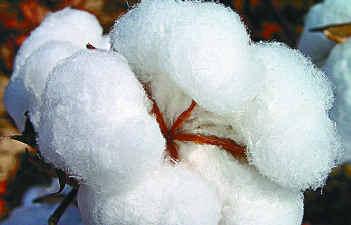Textile materials
By Abdallah el-Kurebe
The Raw Materials Research and Development Council (RMRDC) has joined a league of other GMO advocates to support the production of genetically modified, also known as Bt Cotton in Nigeria.
In a letter to the Country Representative of Monsanto, a global seed company, signed by the Director General of the Council, Dr. Hussaini Ibrahim stated that it was concerned with the current dwindling status of cotton production in Nigeria.
RMRDC, which is an agency under the Federal Ministry of Science and Technology, noted that the textile sector had stabilized Nigeria’s economy when it was in full operation in the 1980s.
Local weaving
“The textile sector provided well over 700,000 jobs, next only to government; it contributed 25 percent of GDP and above 175 ginneries operated at above 80 percent capacity utilization; ginneries and textiles mills were beehive of activities and there were local weaving industries all over the country,” the letter read in parts.
RMRDC further observed that over the years, the textile industry had experienced near collapse leading to “jobs reduction from 700,000 in 1980 to 25,000, presently; reduction of local textile mills from 175 to 25 due mainly to lack of raw materials; only 20 out of 50 ginneries are operating as a result of non availability of seed cotton; low capacity utilisation in ginneries below 30 percent and collapsed local weaving industries.”
Bt Cotton variety
The Council stated that Bt Cotton is a transgenic plant that is incorporated with the Lepidopteran specific Bt gene(s) which control bollworm that belongs to the insect order, Lepidoptera.
According to it, bollworm was capable of reducing yield by up to 70 percent and farmers were distracted from growing cotton because of low profit.
“Pesticides are one of the biggest costs of production for any cotton farmer as bollworm constitutes major limiting effect on yield of cotton that is capable of reducing yield by up to 70 percent depending on the level of infestation. Cotton farmers are tempted to jettison cotton production because of low profitability as a result of cost of insecticides,” the Council stated.
It noted that although Bt Cotton was introduced to Nigeria and Burkina Faso in 2003, “Burkina Faso and China are counting gains of adoption of Bt Cotton,” adding that time was ripe for Nigeria to adopt the technology in order to keep farmers on the farm.
The Council listed benefits of Bt Cotton to include reduction of use of pesticides, reduction of cost of cultivation and hazards associated with pesticides application on humans, animals and environment, and improved opportunities to grow cotton in areas of severe bollworm infestation.
Other benefits are, it allows eco-friendly cultivation of cotton and multiplication of beneficial insects that are parasites and predators of bollworm, Bt Cotton improves yield levels and margin of profit to the farmer.




